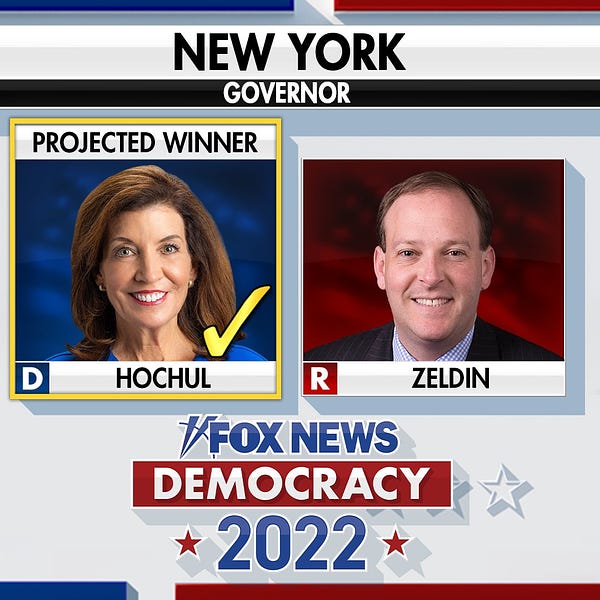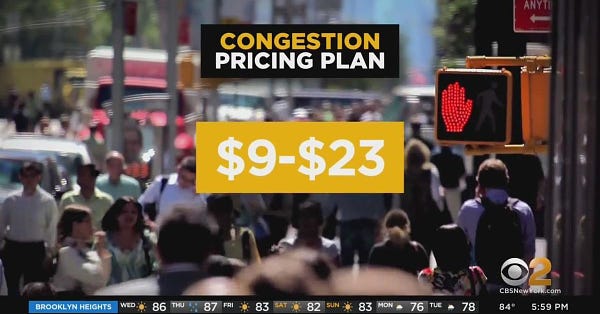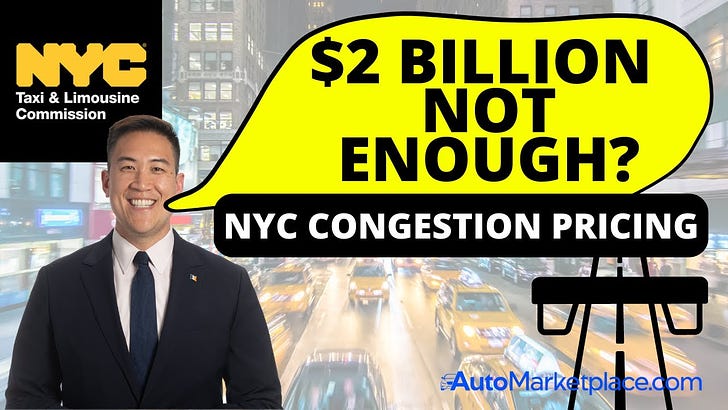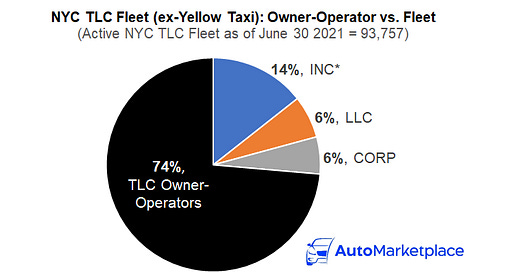

Discover more from AutoMarketplace
🗳️ Hochul Wins NY Governor's Race As Congestion Pricing Takes Center Stage
Democratic incumbent Kathy Hochul is projected to have won her first full term as New York State Governor, likely signaling an end to NYC congestion pricing delays


Democratic incumbent Kathy Hochul is projected to have won her first full term as New York State Governor. While many different policy threads can be pulled on related to her victory, most of our readership will probably be interested in what this victory means for plans around NYC congestion tolling🚦. Her Republican opponent Lee Zeldin, who mounted a surprising challenge, was clearly against implementing congestion pricing, likely helping his popularity among New York “Independents”.


In fact, a closer look at the congressional election results reveal Long Island and other parts of New York & New Jersey, close to the City, flipped Republican this election (Note: Staten Island is generally considered a Republican stronghold in NYC). We’re aren’t trying to imply that congestion pricing is the primary reason for the congressional “flips”, but did want to highlight the results, as both parties clearly diverged on how to handle NYC congestion pricing. Under a Governor Hochul administration, it’s been relatively clear that congestion pricing plans would further progress, with an implementation goal of late next year.
Just before the election, a group of elected officials consisting of NYC Council Members Joseph Borelli (R-South Shore), David Carr (R-Mid-Island), and recently re-elected Congresswoman Nicole Malliotakis (R-Staten Island/South Brooklyn), asked Governor Hochul to hold a statewide referendum that would allow New Yorkers to directly vote on the congestion pricing next year (2023). A thought we had was that the newly elected Republican congressional representatives above (“flips”) could become part of a larger push asking for a direct referendum.
“Elected officials and dozens of organizations, including those representing taxi and livery drivers and trade and civic associations, as well as thousands of private citizens, have voiced their strong opposition to the Central Business District tolling plan…New Yorkers should be provided the opportunity to weigh all of these factors, and to decide whether the Manhattan CBD tolling plan’s potential benefits outweigh its potential costs before it is imposed upon them. The best way to do this is for them vote on this plan on a ballot next November”
- Excerpt from group letter consisting of several elected officials an organizations
Congestion pricing advocates have not wasted anytime post election, making clear their excitement around implementing an NYC congestion tolling system, a first in a major American city.

As it relates to the NYC for-hire transportation (aka TLC) industry, there will be continued pushback arguing for an exemption to additional congestion pricing on TLC vehicles. As we, along with many TLC drivers, driver advocates, New Yorkers and other TLC industry participants, laid out several weeks ago, NOT exempting TLC cars from ADDITIONAL congestion tolls would be a major blow to the industry.
Furthermore, as a large yellow cab taximeter increase is due to be implemented soon, in response to inflationary pressures on drivers, potential trip demand destruction could be significant if additional surcharges are added to fares. Remember, additional congestion tolls will most likely be passed along to the passenger either directly (i.e., toll on trip) or indirectly (i.e., increased trip fare to compensate driver for congestion toll(s)). With fears of a slowing economy, a nascent post pandemic City recovery taking hold and the risk that consumers will cut back on spending, this might not be an ideal moment to make for-hire trips in NYC more expensive 🤔.
TLC Chair Believes FHVs Should Be Exempt
Although the relationship between the NYC Taxi & Limousine Commission (TLC) and TLC drivers can be complicated, to say the least, TLC Chair David Do’s clear support against additional congestion tolls on TLC vehicles will be welcome news.
“Our for-hire vehicles and taxis have paid almost $2 billion to the MTA in congestion charges [over the last four years]”
- NYC Taxi & Limousine Chair David Do
What’s Next?
Since the public comment period related to an environmental assessment (EA) has been completed, the Federal Highway Administration (FHWA) will now review public feedback.
As a reminder, the two key decision making bodies for NYC congestion tolling are:
The 23 member MTA Board
The 6 member Traffic Mobility Review Board (TMRB), which includes current and former MTA Board members

“The TMRB will take into consideration traffic patterns, traffic mitigation measures, operating costs, vehicle types, public impact, public safety, peak and off-peak rates and environmental impacts. Accompanying their recommendations, the TMRB will provide a report…Ultimately, the MTA Board will determine the final toll structure after the TMRB’s recommendations. The recommendations must ensure collection of annual net revenues and fees necessary to fund at least $15 billion for the MTA’s 2020 to 2024 capital program”
- MTA
The FHWA will either:
Issue a finding of no significant impact (FONSI), so the program can proceed, OR
Request an environmental impact statement, requiring additional study
If the Federal Highway Administration (FHWA) approves NYC’s congestion tolling (issues FONSI), the Traffic Mobility Review Board (TMRB), as noted above, would develop recommendations for toll rates, as well as any credits, discounts, or exemptions and then present the recommendations to the MTA Board for consideration before the program is implemented. The program is expected to be implemented within 310 days (i.e., end of 2023) of FHWA approval.
Concluding Thoughts
Remember, a large part of the TLC community is not necessarily against congestion pricing IN GENERAL, but rather TLC vehicles being subjected to ADDITIONAL congestion charges. As we wrote in our original piece on congestion pricing.
Why are NYC TLC vehicles, which are high utilization and transport multiple passengers, facing ADDITIONAL ➕ congestion-related fees? 🤷♀️ NYC yellow cabs and FHVs are already paying congestion fees on *every* trip - $2.75 for FHVs and $2.50 for taxis. This is ON TOP OF being subjected to “vehicle supply cap” mechanisms. In addition, minimum pay standards provide an additional layer of protection related to FHV idling in Manhattan’s CBD.
Aggressive CBD congestion tolling on taxis and FHVs runs the risk of taxing NYC TLC vehicles TOO MUCH, which could severely impact trip demand 📉 as passengers are ultimately paying the tolls. If you destroy trip demand in a way that is greater than the projected MTA revenue you would have otherwise generated with the status quo (or less harsh) congestion tolling regime, one may actually be creating flawed policy.
Yellow cab supply is already capped via the medallion system, with the City just completing a major debt restructuring. Other FHV vehicle supply has been capped (‘TLC Plate Cap’) for the last four years (since August 2018). TLC minimum pay standards tied to utilization rates, coupled with the TLC Plate Cap, provides an additional layer of protection related to idling Ubers & Lyfts (HVFHVs) in Manhattan’s CBD.
As always, let us know your thoughts in the comments section below or by emailing us at info@automarketplace.com.
AutoMarketplace.com NYC covers the for-hire transportation industry and automotive news. Check out AutoMarketplace.com on YouTube ▶️












